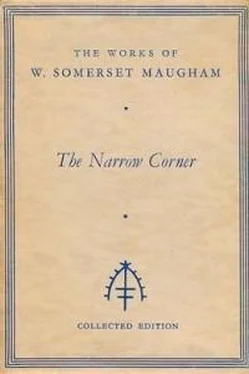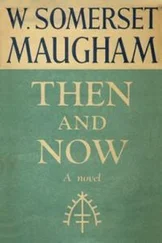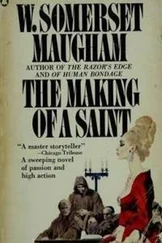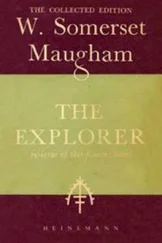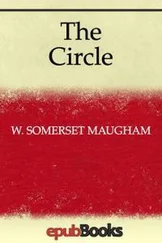It was in the doorway of this store that Dr. Saunders sat now. There was a rattan awning that protected it from the sun, but in the street the sun beat down with a harsh glare. A mangy dog sniffed about some offal over which a swarm of flies was buzzing and looked for something to eat. Two or three chickens scratched about in the roadway and one, squatting, ruffled her feathers in the dust. Outside the shop opposite a naked Chinese child with a distended belly was trying to make a sand castle out of the dust in the road. Flies flew about him, settling on him, but he did not mind them, and intent on his game did not try to brush them away. Then a native passed, with nothing on but a discoloured sarong, and he carried two baskets of sugar–cane suspended to each end of a pole balanced on one shoulder. With his shuffling feet he kicked up the dust as he walked. Inside the store a clerk, hunched over a table, was busy with brush and ink writing some document in Chinese characters. A coolie sitting on the floor was rolling cigarettes and smoking them one after the other. No one came in to buy. Dr. Saunders asked for a bottle of beer. The clerk left his writing and going to the back of the store took a bottle out of a pail of water and brought it along with a glass to the doctor. It was pleasantly cool.
Time hung somewhat heavily on the doctor’s hands, but he was not discontented. He was able to amuse himself with little things, and the mangy dog, the thin chickens, the pot–bellied child all diverted him. He drank his bottle of beer slowly.
HE looked up. He gave a cry of surprise. For there, strolling towards him, down the middle of the dusty road, were two white men. No ship was in and he wondered where they had come from. They walked idly, looking to right and left of them, like strangers visiting the island for the first time. They were shabbily dressed in trousers and singlets. Their topis were grimy. They came up, saw him sitting in the open shop and stopped. One of them addressed him.
“Is this Kim Ching’s?”
“Yes.”
“Is he here?”
“No, he’s sick.”
“Bad luck. I suppose we can get a drink.”
“Surely.”
The speaker turned to his companion.
“Come on in.”
They entered.
“What’ll you have?” asked Dr. Saunders.
“A bottle of beer for me.”
“Same here,” said the other.
The doctor gave the order to the coolie. He brought bottles of beer and chairs for the strangers to sit on. One of them was middle–aged, with a sallow, lined face, white hair and a scrub of white moustache. He was of the middle height, spare, and when he spoke he showed hideously decayed teeth. His eyes were cunning and restless. They were small and pale and set somewhat close together, which gave him a foxy look, but his manner was ingratiating.
“Where have you come from?” asked the doctor.
“We just come in on a lugger. From Thursday Island.”
“A goodish way. Have fine weather?”
“Couldn’t want better. A nice breeze and no sea to speak of. Nichols’ my name. Captain Nichols. Maybe you’ve ’eard of me.”
“I can’t say I have.”
“I been sailin’ these seas for thirty years. There’s not an island in the Archipelago I ain’t put in at one time or another. I’m pretty well known around ’ere. Kim Ching knows me. Known me for twenty years.”
“I’m a stranger myself,” said the doctor.
Captain Nichols looked at him, and though his face was open and his expression cordial, you had a feeling that there was suspicion in his glance.
“I seem to know your face,” he said. “I could swear I seen you somewhere.”
Dr. Saunders smiled but did not volunteer any information about himself. Captain Nichols screwed up his eyes in the effort to remember where he had run across the little man. He scanned his face with attention. The doctor was short, only just over five foot six, and slight, but with something of a paunch. His hands were soft and podgy, but they were small, with tapering fingers, and if he had been vain it was possible to suppose that once upon a time he had been not a little pleased with them. They had still a sort of well–bred elegance. He was very ugly, with a snub nose and a large mouth; and when he laughed, which he did often, you saw big, yellow, uneven teeth. Under his bushy grey eyebrows his green eyes gleamed bright, amusing and clever. He was not very closely shaved and his skin was blotchy; he had a high colour which over the cheek–bones spread into a purple flush. It suggested some long–standing affection of the heart. His hair must once have been thick and black and coarse, but now it was nearly white and on the crown very thin. But his ugliness, far from being repellent, was attractive. When he laughed his skin puckered round the eyes, giving his face infinite vivacity, and his expression was charged with an extreme but not ill–natured malice. You would have taken him then for a buffoon, but for the shrewdness that gleamed from his shining eyes. His intelligence was obvious. And though merry and bright, fond of a joke and amused both at his own and at others’, you had an impression that even in the abandon of laughter he never quite gave himself away. He seemed to be on his guard. For all his chattiness and however hearty his manner, you were conscious (if you were observant and did not allow yourself to be taken in by his superficial frankness) that those merry, laughing eyes were watching, weighing, judging and forming an opinion. He was not a man to take things at their face value.
Since the doctor did not speak Captain Nichols went on:
“This is Fred Blake,” he said, with a gesture of his thumb towards his companion.
Dr. Saunders nodded.
“Makin’ a long stay?” continued the captain.
“I’m waiting for the Dutch packet.”
“North or south?”
“North.”
“What did you say your name was?”
“I didn’t mention it. Saunders.”
“I’ve knocked about too long in the Indian Ocean to ask questions,” said the captain, with his ingratiating laugh. “Ask no questions and you won’t be told no lies. Saunders? I’ve known a lot of chaps as answered to that name, but whether it was theirs or not by rights nobody knew but theirselves. What’s the matter with old Kim Ching? Fine old sport. I was lookin’ forward to ’avin’ a bit of a chin–wag with ’im.”
“His eyes went back on him. He’s had cataract.”
Captain Nichols sat up and held out his hand.
“Doc Saunders. I knew I’d seen your face. Fu–chou. I was up there seven years ago.”
The doctor took the proffered hand. Captain Nichols turned to his friend.
“Everyone knows Doc Saunders. Best doctor in the Far East. Eyes. That’s his line. I ’ad a pal once, everyone said ’e’d go blind, nothing could stop it, ’e went to see the doc and in a month ’e could see as well as you or me. The Chinks just swear by him. Doc Saunders. Well, this is a joyful surprise. I thought you never left Fu–chou from one year’s end to the other.”
“Well, I have now.”
“It’s a bit of luck for me, this. You’re the very man I wanted to meet.” Captain Nichols leaned forward and his cunning eyes fixed the doctor with an intensity in which there was something very like menace. “I suffer from dyspepsia something awful.”
“Oh, Christ!” muttered Fred Blake.
It was the first time he had spoken since they sat down and Dr. Saunders turned to look at him. He slouched in his chair, gnawing his fingers, in an attitude that suggested boredom and ill–humour. He was a tall young man, slight but wiry, with curly, dark brown hair and large blue eyes. He did not look more than twenty. In his dirty singlet and dungarees he looked loutish, an unlicked cub, thought the doctor, and there was a surliness in his expression that was somewhat disagreeable; but he had a straight nose and a well–formed mouth.
Читать дальше
Конец ознакомительного отрывка
Купить книгу
